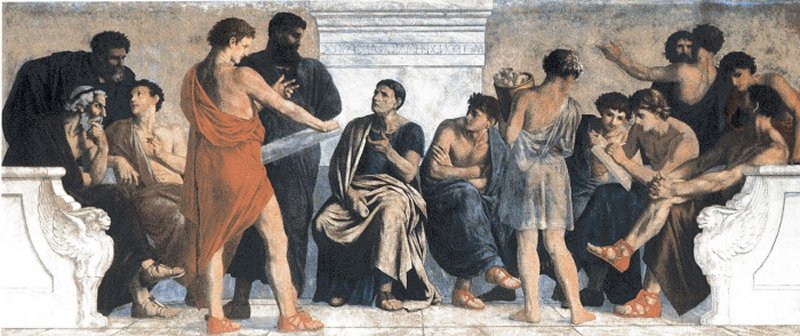Aristotle: First Book Collector Who Assembled The First Great Library Of Antiquity
A. Sutherland - AncientPages.com - Aristotle of Stagira (c. 384 BC - 322 BC) founded his own school, called High School, in the year 335 BC.
It was located just outside Athens in the vicinity of a beautiful grove dedicated to the god Apollo Lyceus. This prominent school, certainly comparable to our modern universities, became known as the Lyceum, an education and research center.
"That most enduring of romantic images, Aristotle tutoring the future conqueror Alexander". Illustration by Charles Laplante, 1866. Public Domain
It was also known as a 'Peripatetic School' (Greek word peripatos, means stroll) as it is believed that Aristotle liked to walk with his student along the school’s walkways, discussing philosophy and the principles of mathematics.
Aristotle’s great school also played a crucial role as a library and museum. Supported by a large monetary gift of 800 talents from Alexander the Great, Aristotle organized his impressive collection of plant and animal specimens and collected diverse manuscripts and maps of great value.
Aristotle also encouraged the school’s teachers to gather information regarding medicine, mathematics, physics, botany, philosophy, astronomy, rhetoric ethics, theology, cosmology, and other areas of science. Members of his Lyceum were busy conducting research on a wide range of subjects.
This great thinker has prepared enormous material as a basis for lectures. Aristotle is considered the first book collector to assemble the first great library of antiquity.
Later, passed into the hands of the philosopher Neleus of Skepsis, and the library lost its connection with the School. The books did not return to its original place but were scattered. His intellectual legacy is enormous and contains scientific lectures and literary and scientific works, as evidenced by 143 works in 400 books, not counting letters and poetry.
Before his death in 322 BC, Aristotle handed over a library along with his own manuscript legacy to his Theophrastus of Eresos (c. 371–287 BC), who was his successor, Aristotle’s close colleague, philosopher and successor at the Lyceum, who wrote many treatises, in all areas of philosophy, in order to support, improve, expand, and develop the Aristotelian system.
The School of Aristotle. Fresco by Gustav-Adolph Spangenberg, circa 1883-1888. Gustav Adolph Spangenberg — source - Public Domain
Until the death of Theophrastus in 287 BC, Aristotle's famous lectures were the basis of teaching in the school.
As Edith Hall, a British scholar of classics, wrote, “the papyrus on which most ancient Greek and Latin books were recorded, as an organic material, was extremely vulnerable to rotting and wear and tear”…and “two generations later the collection of rolls ended up in the hands of some “ordinary people” of Scepsis in Asia Minor, who did not know how to store its precious contents…”
According to one version, Neleus od Scepsis, a pupil of Theophrastus, kept the original manuscripts of both philosophers but sold other books from the library to Ptolemy II, the ruler of Egypt who was at that time occupied with the creation of his own great library at Alexandria.
Later the library of the Stagira got into the hands of people who kept books in very bad conditions because Neleus’ descendants, who inherited the priceless works had no idea how to store them. They only wanted to protect the writings from being stolen. Kept for a very long time in the dark basement, the manuscripts were damaged.
Aristotle’s work was not in the form of ordinary books but only notes and manuscripts, and yet, his surviving writings were incredibly influential.
More than 2300 years after his death, Aristotle remains one of the most influential people ever. He contributed to almost every field of human knowledge then in existence, and he was the founder of many new fields of science.
Updated on January 29, 2023
Written by – A. Sutherland - AncientPages.com Senior Staff Writer
Copyright © AncientPages.com All rights reserved. This material may not be published, broadcast, rewritten or redistributed in whole or part without the express written permission of AncientPages.com
Expand for referencesReferences:
Lancour H. Daily Jay E. Encyclopedia of Library and Information Science: Volume 24
Baker R.F. Baker III, C. F. Ancient Greeks: Creating the Classical Tradition
Stanford Encyclopedia of Philosophy
More From Ancient Pages
-
 Sodré Astrolabe, Found On Portuguese Armada Shipwreck Is The Oldest In The World
Archaeology | Mar 19, 2019
Sodré Astrolabe, Found On Portuguese Armada Shipwreck Is The Oldest In The World
Archaeology | Mar 19, 2019 -
 An Ancient Goldsmith’s Unexplained Encounters With The Unknown
Ancient Mysteries | Apr 16, 2019
An Ancient Goldsmith’s Unexplained Encounters With The Unknown
Ancient Mysteries | Apr 16, 2019 -
 Mystery Of Ancient Gaza Wine – New Insight
Archaeology | Apr 26, 2023
Mystery Of Ancient Gaza Wine – New Insight
Archaeology | Apr 26, 2023 -
 Dinosaurs Were The First To Take The Perspectives Of Others
Fossils | Jun 1, 2023
Dinosaurs Were The First To Take The Perspectives Of Others
Fossils | Jun 1, 2023 -
 Karahunge – ‘Speaking Stones’ With Secrets – Remarkable Prehistoric Structures Of Armenia
Places | Jun 4, 2020
Karahunge – ‘Speaking Stones’ With Secrets – Remarkable Prehistoric Structures Of Armenia
Places | Jun 4, 2020 -
 Sinuses Prevented Prehistoric Crocodile Relatives From Deep Diving
Evolution | Nov 7, 2024
Sinuses Prevented Prehistoric Crocodile Relatives From Deep Diving
Evolution | Nov 7, 2024 -
 Neanderthals Of The Mediterranean Areas Became Extinct But Not Because Of Climate
Archaeology | Jul 20, 2020
Neanderthals Of The Mediterranean Areas Became Extinct But Not Because Of Climate
Archaeology | Jul 20, 2020 -
 Why Is A Biscuit Named After Giuseppe Garibaldi – Italy’s Military Leader And Hero?
Ancient History Facts | Feb 19, 2017
Why Is A Biscuit Named After Giuseppe Garibaldi – Italy’s Military Leader And Hero?
Ancient History Facts | Feb 19, 2017 -
 Mysterious Moon-Eyed People – Ancient Subterranean Race In Conflict With The Cherokee
Featured Stories | Dec 28, 2017
Mysterious Moon-Eyed People – Ancient Subterranean Race In Conflict With The Cherokee
Featured Stories | Dec 28, 2017 -
 Syamantaka – Divine Jewel With Magical Powers Was A Gift From The Sun God In Hindu Mythology
Featured Stories | Mar 1, 2019
Syamantaka – Divine Jewel With Magical Powers Was A Gift From The Sun God In Hindu Mythology
Featured Stories | Mar 1, 2019 -
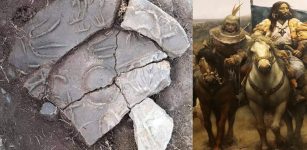 Lost Ancient Dragon City Of The Xiongnu Empire Discovered In Mongolia
Archaeology | Jul 22, 2020
Lost Ancient Dragon City Of The Xiongnu Empire Discovered In Mongolia
Archaeology | Jul 22, 2020 -
 Ivan The Terrible: Military Arsenal Unearthed Near Moscow
Archaeology | Jan 2, 2016
Ivan The Terrible: Military Arsenal Unearthed Near Moscow
Archaeology | Jan 2, 2016 -
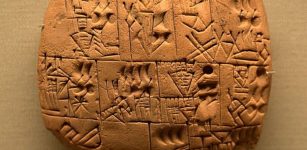 Uruk – Home To The Legendary Hero Gilgamesh
Featured Stories | Jun 6, 2021
Uruk – Home To The Legendary Hero Gilgamesh
Featured Stories | Jun 6, 2021 -
 On This Day In History: Charlemagne Became The King Of The Franks – On Dec 5, 771
News | Dec 5, 2016
On This Day In History: Charlemagne Became The King Of The Franks – On Dec 5, 771
News | Dec 5, 2016 -
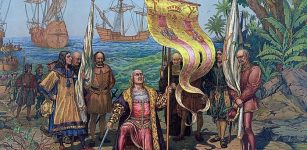 No Evidence Ancient Caribbeans Were Cannibals – Scientists Say
Archaeology | Aug 23, 2021
No Evidence Ancient Caribbeans Were Cannibals – Scientists Say
Archaeology | Aug 23, 2021 -
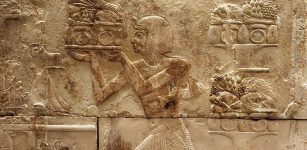 Pharaoh Ramesses I Whose Mummy Was Stolen And Displayed As A Freak Of Nature For 130 Years
Featured Stories | Jul 31, 2021
Pharaoh Ramesses I Whose Mummy Was Stolen And Displayed As A Freak Of Nature For 130 Years
Featured Stories | Jul 31, 2021 -
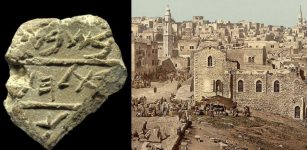 Ancient Seal Found In The City Of David: Evidence Of Bethlehem’s Existence Long Before Jesus Was Born
Archaeology | May 24, 2012
Ancient Seal Found In The City Of David: Evidence Of Bethlehem’s Existence Long Before Jesus Was Born
Archaeology | May 24, 2012 -
 Tooth Enamel Reveals Life Histories Of Early Humans
Archaeology | Jan 16, 2023
Tooth Enamel Reveals Life Histories Of Early Humans
Archaeology | Jan 16, 2023 -
 Irish God Ogma – Outstanding Warrior And Inventor Of The Ogham Script
Myths & Legends | Jul 3, 2024
Irish God Ogma – Outstanding Warrior And Inventor Of The Ogham Script
Myths & Legends | Jul 3, 2024 -
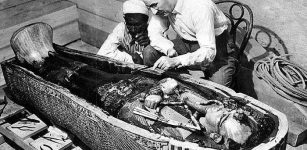 On This Day In History: King Tut’s Tomb Is Unsealed And Opened – On Feb 16, 1923
News | Feb 16, 2017
On This Day In History: King Tut’s Tomb Is Unsealed And Opened – On Feb 16, 1923
News | Feb 16, 2017

!["That most enduring of romantic images, Aristotle tutoring the future conqueror Alexander".[147] Illustration by Charles Laplante [fr], 1866](https://www.ancientpages.com/wp-content/uploads/2017/06/aristotlealexander1.jpg)
